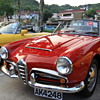Posted 11 years ago
 VirginiaIron
VirginiaIron
(15 items)
Greetings!
Yesterday, I picked up my first cast iron skillet with a hammer-like finish. The skillet does not spin. The handle has a 7 on the upper side with 2 dots on the lower side. I am thinking that this one is an unmarked piece from early to mid 20th century. The green placemat is an afterthought once I noticed the sharp looks I was receiving from the other side of the room -oops! lol.
From the Cast Iron Collector: http://www.castironcollector.com/hammered.php
"If you have collected vintage cast iron cookware for even a short time, you're bound to have come across a pan with a "hammered" finish. Like plating, a hammered finish was intended to give a more upscale appearance to the cookware. The dimpled finish mimicked that of more finely-made service ware.
Hand hammering was a common decorative technique on pieces made of softer materials like brass, copper, and tin. The metalsmith would spend a great deal of time and effort to meticulously create the hundreds if not thousands of same-sized impressions on each piece.
"Hammered" cast iron, and cast aluminum as well, differs in that the dimpling is molded in, rather than applied afterwards. The type of iron typically used to make pots and pans is not malleable enough to be hammered, to say nothing of the time and enormous expense a skilled craftsman's labors would add to each relatively inexpensive piece. Therefore, it is the pattern which is hammered, and whose characteristics are then transferred to each mold.
Among hammered pieces, skillets and dutch ovens were relatively common, often being plated as well. Other hammered pieces more rarely found include waffle irons and corn stick pans.
Variations in the hammering style are seen from one manufacturer to another. The dimple edges may be sharp and distinct, or more subdued. Chicago Hardware Foundry and Wagner pieces typically have larger indentations, about 1/4" to 3/8" in diameter."
I will be attempting to identify this. All comments are welcome. Thank you for reading.












Sorry, but this is a simple cast iron skillet. Hammer forging cast iron doesn't work.
Thank you.
Often cast iron erosion looks like hammer marks.
Those marks are not erosion. From my understanding, the hammer finish was more prestigious than plain cookware and it wasn't until later that it was more available to the mass markets. The hammer finish is also seen in aluminum and Copper, Here are some photos which I believe you will agree is not erosion.
https://www.google.com/search?q=hammer+finish+cast+iron+cookware&source=lnms&tbm=isch&sa=X&ei=cJRdU7KPBarNsASusIHYBg&ved=0CAcQ_AUoAg&biw=1455&bih=705
There is a vast difference between a cast-in pattern & actual hammered. You can hammer wrought iron. I was just trying to point out something & explain metallurgy properties. No argument here.
OK, I did not think you were being argumentative. In the interest of being accurate I will remove the (-ed) from hammer and add (-like) so that others will not be confused. Thank you for your comments.
The "hammered" look pieces were cast like this. A hammer never touched them. Chicago Hardware Foundry make a lot of pieces in this style, but they usually had marking on the bottom. This handle doesn't look like a CHF handle either. Lodge also has some earlier pieces like this. Not sure exactly what foundry it's from.
Thanks, Jonima. Here is a quote from the Cast Iron Collector http://www.castironcollector.com/hammered.php "Variations in the hammering style are seen from one manufacturer to another. The dimple edges may be sharp and distinct, or more subdued. Chicago Hardware Foundry and Wagner pieces typically have larger indentations, about 1/4" to 3/8" in diameter. Lodge and Griswold hammered pieces exhibit a higher density of smaller dimples, about 1/8" to 1/4" each...."
So it looks like it is not Lodge or Griswald.
Hello, I realize this thread is very old, but I just stumbled across it. I have a pan which looks exactly like the one in your picture. Relatively large dimple marks with two dots on bottom of handle (or maybe three - I can't remember and can't check right now as I am at work), no manufacturer listed on the bottom, and a relatively small hole at the end of the handle for hanging. It is a very good cooker! I am trying to identify the manufacturer. By the larger dimple marks, I am thinking it may be a Wagner, but am not sure. Have you been able to identify yours yet? Thanks!! John
Just an update on mine. Diameter is 7 1/2 inches. It is a number 5, and 5 is stamped on the handle in the same area as the 7 on yours, and the bottom of the handle actually has 4 dimples. If anybody knows who made these pans, please let us know. Thanks! John.